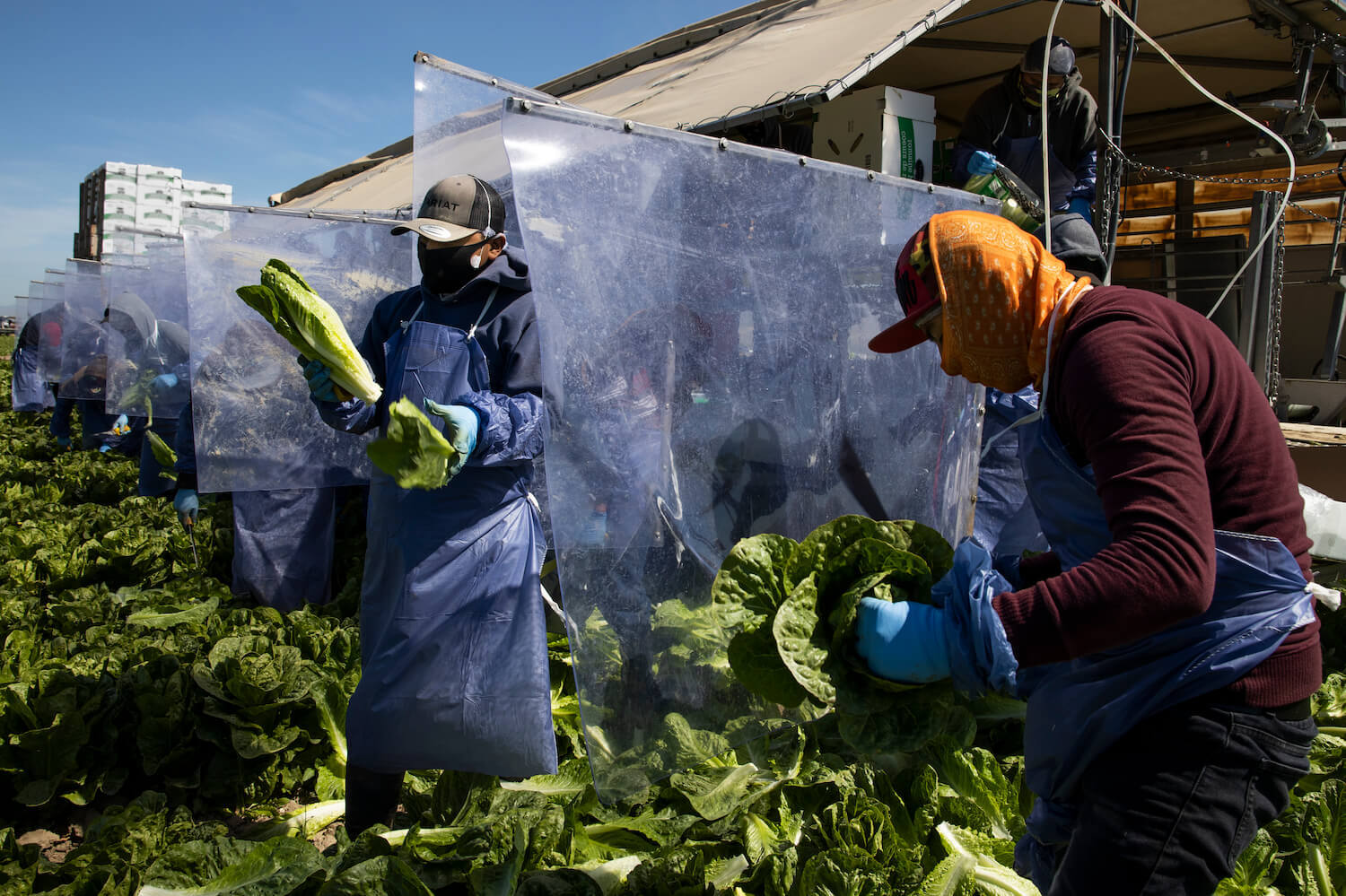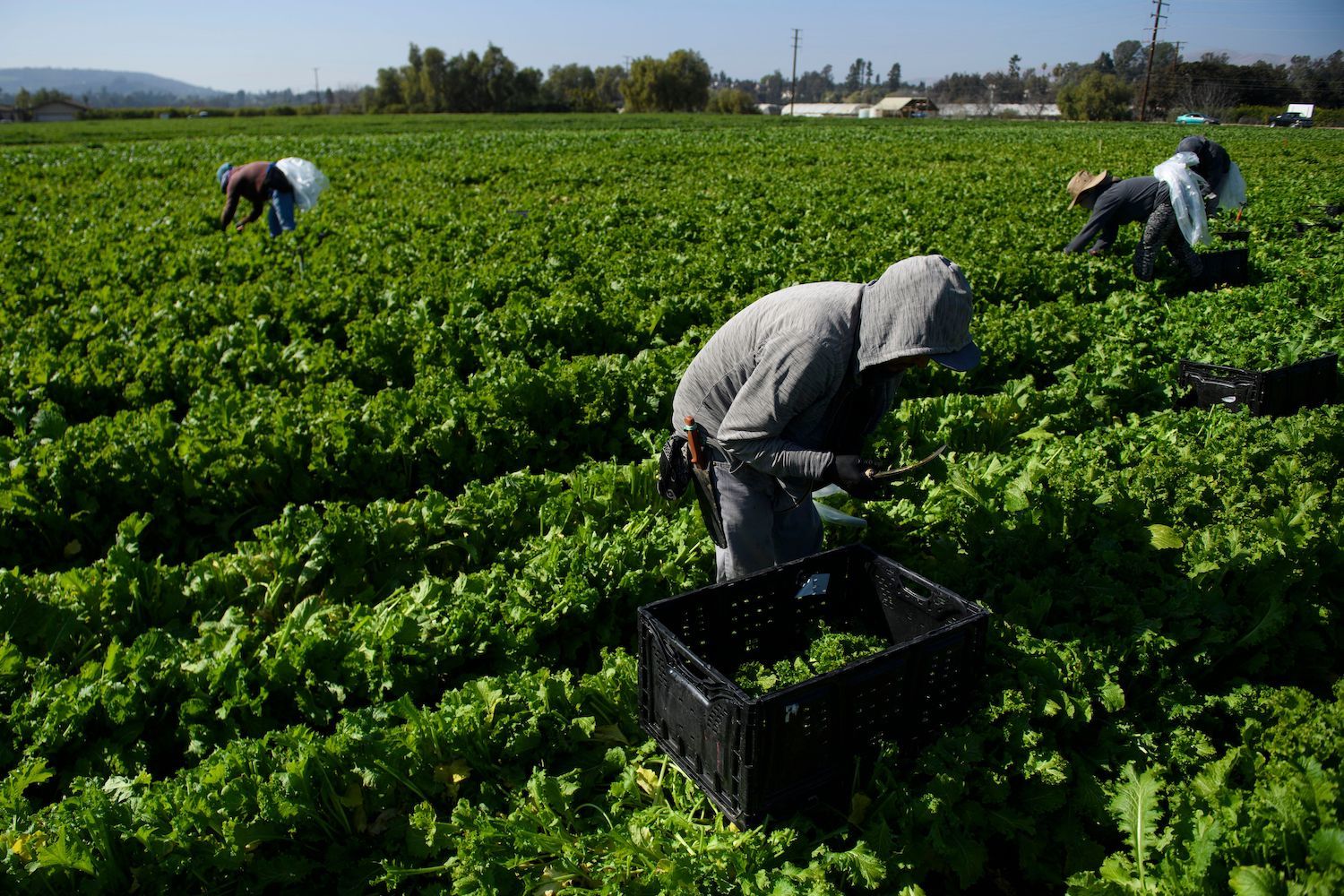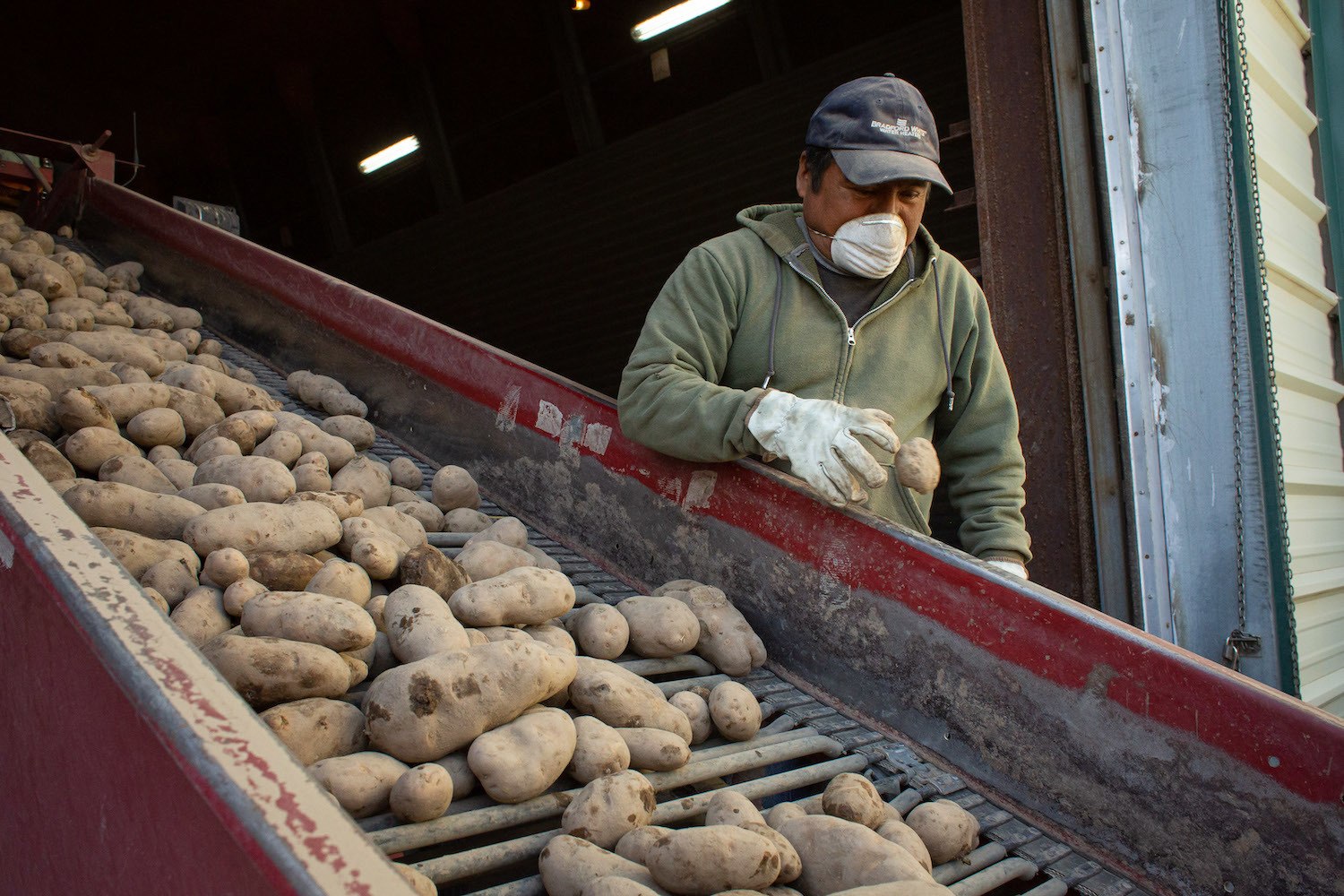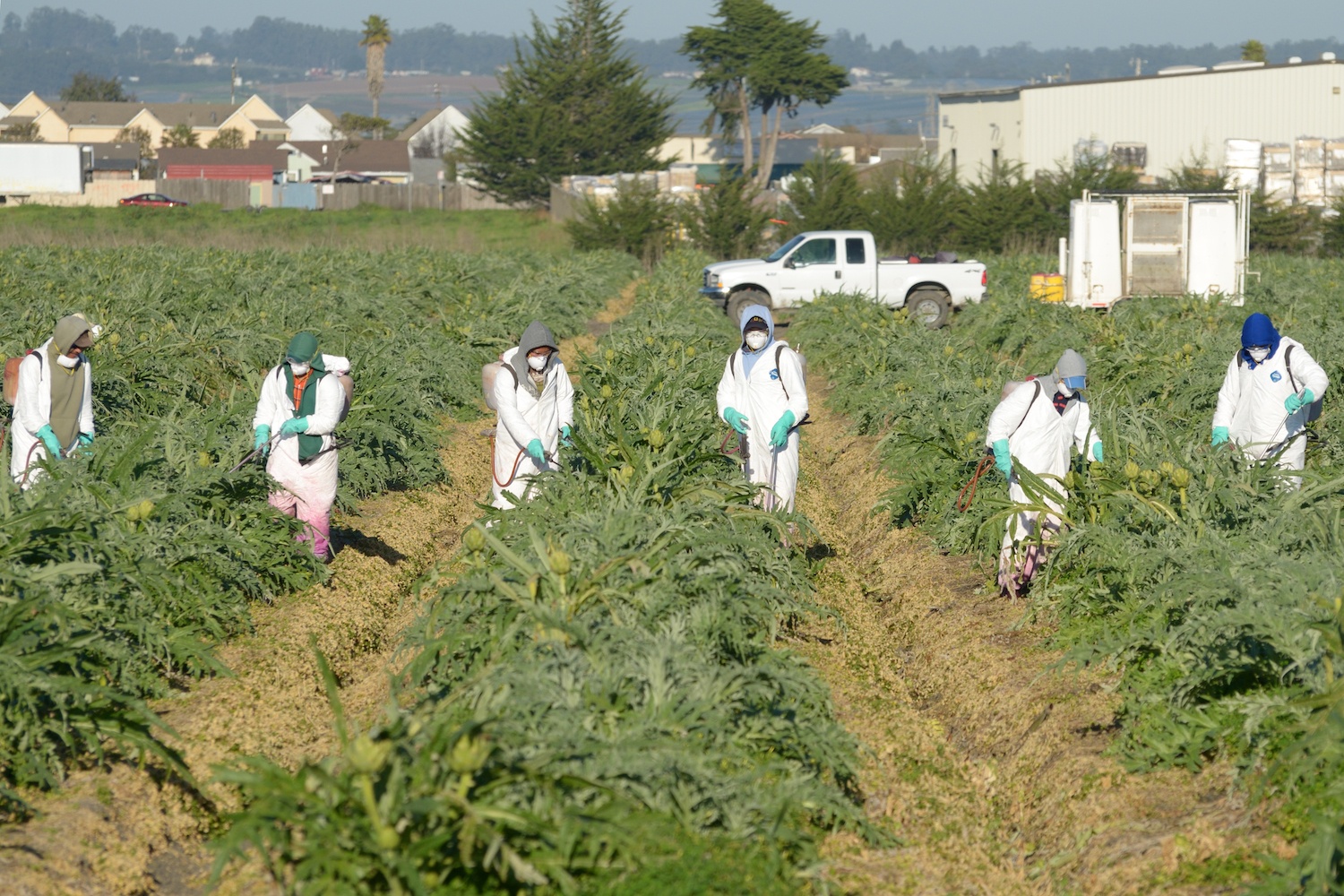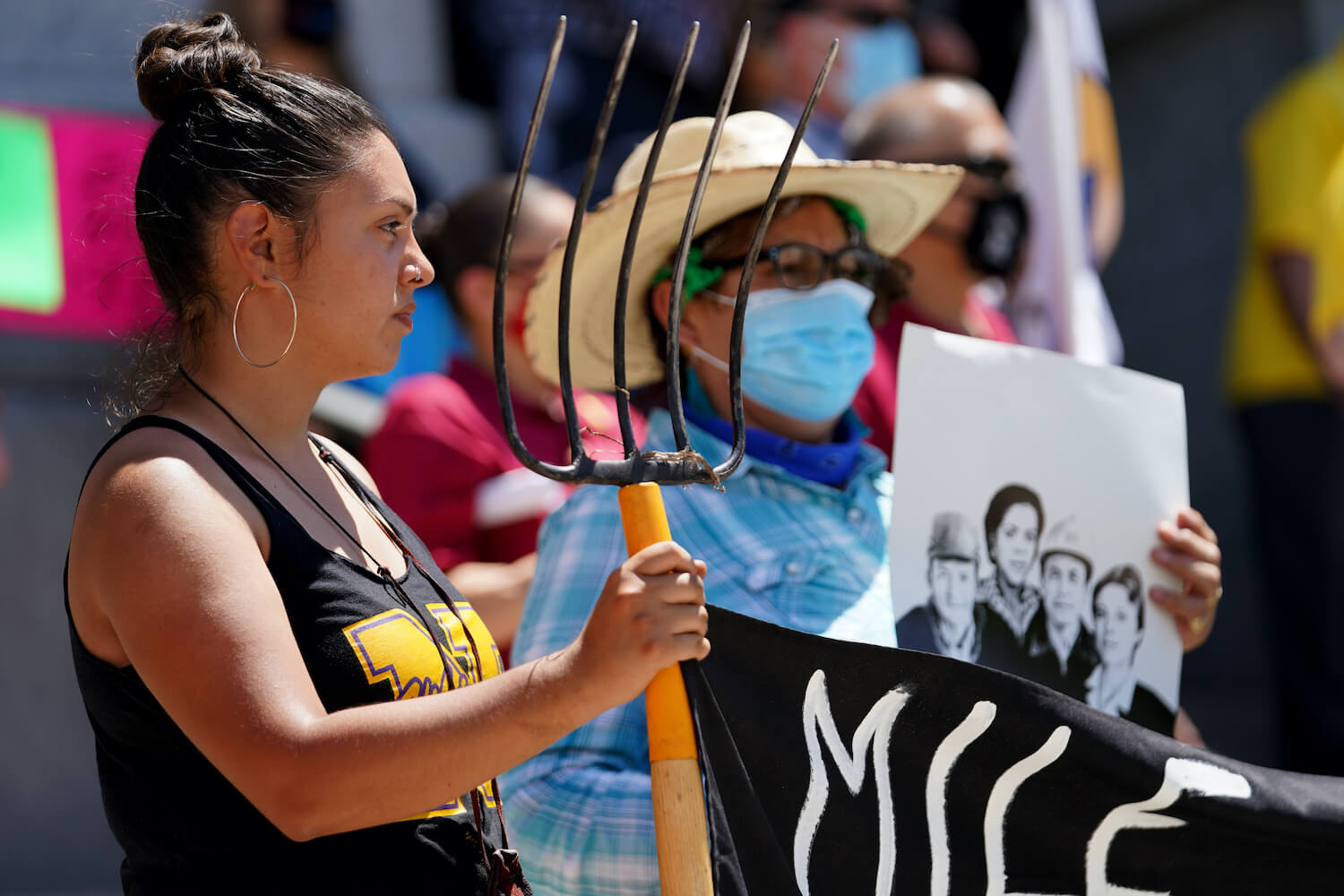
Hyoung Chang/The Denver Post
Labor advocates accustomed to pushback say negotiating a bill that includes state minimum wage, overtime pay, rights to organize, and access to healthcare has been an uphill battle in the current climate around immigration.
Update, June 25, 2021: On Friday afternoon, Colorado’s Democratic Governor Jared Polis signed Senate Bill 87 into law.
Colorado’s Democratic Governor Jared Polis is soon expected to sign a piece of legislation that will grant extensive protections to farmworkers—going well beyond what bills recently passed in Washington and California gained in securing overtime pay.
Pictured above: Organizers stand in front of the Colorado State Capitol Building to champion the “Farmworker Bill of Rights” in Denver, Colorado on Thursday, May 20, 2021.
The legislation is expected to impact nearly 40,000 agricultural employees in Colorado, 3,000 of whom live in employer-provided housing and have long endured unsanitary, cramped conditions and grueling work hours with few breaks, according to advocates and workers themselves.
Senate Bill 87, also known as the Farmworker Bill of Rights, will require that farmworkers be paid Colorado’s minimum wage—$12.32 an hour statewide—and mandates overtime pay when workers exceed 12 hours in a single day or 40 hours in a week. Currently, farms and ranches are are only required to pay the federal minimum wage of $7.25 an hour and farmworkers are not permitted to receive overtime pay. (The parameters around the overtime rates included in this bill will be determined by a “rulemaking process” at a later date.)
“Giving workers rights and the right to organize always freaks people out, so we have to expect that.”
In addition, workers will be able to organize and join labor unions, engage in collective bargaining, and hold strikes, among other protections. Josette Jaramillo, Colorado president of the American Federation of Labor and Congress of Industrial Organizations (AFL-CIO) said the union is “ready to welcome farmworkers with open arms.”
“We welcome their voices, and welcome the opportunity to continue to improve the lives of the undocumented workers who are doing this work,” Jaramillo said. “We have an opportunity to organize a group of workers that haven’t been able to organize in Colorado. Giving workers rights and the right to organize always freaks people out, so we have to expect that.”
This bill represents a paradigm shift for farmworker protections. Other states have passed similar proposals in a piecemeal approach over the course of many years, but Colorado’s bill is the first of its kind to go beyond pay increases to address historically racist labor policies and consider the broader aspects of a farmworker’s well-being, including access to healthcare and other services.
Once Polis signs the bill (something he was expected to do last week), the bill’s proponents believe it will go into effect by the next growing season, giving employers what the bill’s authors hope is ample time to adjust to the new provisions. For example, employers who currently provide housing and transportation to workers will be prohibited from interfering with a worker’s ability to receive on-site visits from medical professionals and community health providers, and employers will be required to take workers on weekly visits to sites where they can access services, including healthcare.
“Sometimes when we are provided a bathroom, we have to avoid drinking water because they won’t let us go to the bathroom often.”
SB 87 also grants agricultural employees meal breaks and rest periods throughout each work period—basic benefits employers are not currently mandated to provide—and limits the use of controversial short-handled hoes. The 10-12-inch tool requires farmworkers to spend shifts as long as 12 hours bent over, digging crops out of the soil, which can lead to lifelong, debilitating back injuries. California banned use of the tool decades ago.
Democratic Representative Yadira Caraveo, one of the bill’s sponsors, said she supported it because of her own family’s history with farm work and because of “how few benefits and rights” farmworkers have. As part of the process, Caraveo said she spoke to farmworkers who had not received medical care for 10 to 20 years because they were undocumented and the farms they lived on restricted access to medical care.
“Their hours are so long that they can’t really say, ‘I’m going to leave for a couple of hours to go to a medical appointment.’ Even though there are groups and individuals interested in bringing the medical care to them, there are many farm owners that restrict who has access to them because they don’t want to let people see some of the conditions that these workers live in and some of the chronic conditions that they end up with from using things like the short-handled hoe,” Caraveo said.
An estimated 83 percent of the nation’s farmworkers are Latino and nearly half are undocumented; about 10 percent are immigrants working with H-2A temporary visas.
The bill also addresses the ongoing fear some workers have of reporting abuse and mistreatment by their employers to authorities, something many are hesitant to do for fear of retaliation in the form of termination, wage theft, or deportation. Notably, SB 87 enables workers, their relatives, or workers’ representatives to file abuse complaints with the Department of Labor and Employment’s Division of Labor Standards. A lawyer or health provider who is unable to access a worker could also file a complaint on their behalf, and the DOL could take legal action against those who retaliate against workers and whistleblowers for reporting abuse.
The bill’s proponents—many of whom are accustomed to tackling uphill battles in the farming industry—said that SB 87’s legislative process was particularly polarizing, making it risky for farmworkers to participate in. Advocates developed workarounds. In the months leading up to the bill’s passage, advocacy organizations enlisted the help of promotoras—Latino community members who perform outreach and provide education—to conduct interviews with workers in order to testify on their behalf during the bill’s committee hearings. (The Counter wrote about promotoras here.)
In one interview transcript reviewed by The Counter, an agricultural worker told a story about a fellow farmworker named José, who became ill and was restricted from leaving his migrant camp in Center, Colorado. The worker said José had called a promatora at 2 a.m. to request help. Later that morning, when the promatora arrived to take José to urgent care, the only way he could leave the camp was by jumping a fence. In another interview, an agricultural worker in northeastern Colorado said she and other workers are not always provided water or bathroom breaks.
“There was a lot of pushback. Not everyone has done the work to understand these issues, and it’s really difficult and challenging to talk about racism in your own industry. A lot of people don’t associate racism with the food system and they haven’t experienced the racism that is in our food system.”
“Sometimes when we are provided a bathroom, we have to avoid drinking water because they won’t let us go to the bathroom often,” the worker said, adding that she wanted to tell legislators that it was time to assert farmworkers’ basic rights—including the rights of those who are undocumented.
Nicole Civita, an attorney, educator, and policy director for the Colorado advocacy organization Project Protect Food Systems Workers, said the contentious nature of getting the bill passed was beyond the expected industry pushback. In part, she said, this was because of the demographics of farmworkers and “the current climate around immigration.” An estimated 83 percent of the nation’s farmworkers are Latino and nearly half are undocumented; about 10 percent are immigrants working with H-2A temporary visas.
The bill’s provisions and the language of SB 87 have evolved significantly in response to opposition from farmers, ranchers, and groups like the Rocky Mountain Farmers Union and the Colorado Farm Bureau—though these two groups have changed their official stances from “oppose” to “neutral” and “monitor,” respectively.
A spokesperson for the Colorado Farm Bureau said its priority was ensuring that farmers can utilize the federal H-2A guest worker program without violating state regulations and without disincentivizing H-2A employees from working in Colorado.
“We’ve had to make the argument over and over again that we are not claiming farmers are individually or personally racist. We are saying that excluding agricultural workers from these laws is tied to the legacy of enslavement.”
“It was key that this bill worked for everyone involved: employees and employers,” the spokesperson said in an emailed statement. “Workers deserve safe and dignified working conditions but the initial strict, inflexible requirements in the bill would have put regulations in statute that would have been unworkable for employees, farmers and ranchers.”
Additional opposition came from other, more surprising cohorts. Erin Foster West, the western campaigns director for NYFC, which has supported the bill, said that working in coalition means chapters sometimes disagree—and this is especially true when a bill addresses racism, exploitation, and equity.
“There was a lot of pushback. Not everyone has done the work to understand these issues, and it’s really difficult and challenging to talk about racism in your own industry,” Foster West said. “A lot of people don’t associate racism with the food system and they haven’t experienced the racism that is in our food system.”
“This legislation is aimed at a series of laws that maintain unequal power distribution among racial lines, and because of that, every step of the process was really disheartening.”
Federal and most state laws exempt farmworkers from the overtime protections that are guaranteed to other workers, a precedent set by the 1938 Fair Labor Standards Act, which was written to exclude Black agricultural and domestic workers from a wage floor. While other states already offer farmworkers collective action protection, overtime, and guaranteed restroom breaks, Civita said what makes Colorado’s bill unique is that it addresses “many historically and structurally racist exclusions all at once.”
But what makes this negotiation especially challenging is resistance from farm owners who see the bill as a personal attack rather than an attempt to dismantle nearly a century of racist labor policy.
“We’ve had to make the argument over and over again that we are not claiming farmers are individually or personally racist,” Civita said. “We are saying that excluding agricultural workers from these laws is tied to the legacy of enslavement. This isn’t an opinion; you can look at the legislative record and see how these laws were specifically designed to maintain their exclusion and to maintain class distinctions and wage structures between what the legislators at the time called white and ‘colored people.’ These laws were created to harm Black folks, and over time they have harmed immigrants.”

Perdita Butler of Frontline Farming stands in front of Colorado State Capitol Building for SB21-87, the Farmworker Bill of Rights, in Denver, Colorado.
Hyoung Chang/The Denver Post
At the same time, it seemed to Civita that there was no better time to do this work.
“There was a national conversation happening about essential but expendable workers, and there was a national reckoning with structural racism,” Civita said. “This legislation is aimed at a series of laws that maintain unequal power distribution among racial lines, and because of that, every step of the process was really disheartening.”
Fatuma Emmad shared a similar stance. She is a farmer and the co-founder and executive director of the food and farmers advocacy group Frontline Farming. She said farmers of color who supported the bill were regularly dismissed by farmers, ranchers, and legislators, and that white farmers who opposed the bill told her she made them feel “unsafe.”
As one of the most recognized advocates for farmers of color in the state, Emmad said there can be a lot of disagreement in Colorado’s farming communities regarding policy—most notably when it comes to regenerative versus conventional farming. Usually these splits are between younger and older farmers, and as an advocate and educator, Emmad said she tries to bridge these conversations through education. But she did not anticipate how contentious the battle around SB 87 would become, or that young farmers she thought of as allies would oppose the bill.
“There was just a crazy amount of racism surrounding this bill and it was disturbing to see young farmers and regenerative ag people who have all of these ethics for land have none for how they treat their people,” Emmad said. “I’m glad this bill passed, and I’m going to keep saying what I’ve been saying all along: This isn’t about identity politics. This is about better farming. This is about a better, safer world and about addressing what’s happening on farms by actually protecting the people doing this work.”
Correction: A former version of this story said that the Four Corners chapter of the National Young Farmers Coalition (NYFC) also initially opposed SB 87, but has since moved its stance to “neutral.” That is not correct. Four Corners disbanded from NYFC in April of 2021 and is now an independent group and local chapter of the Rocky Mountain Farmers Union, which opposes the bill. We regret the error.

